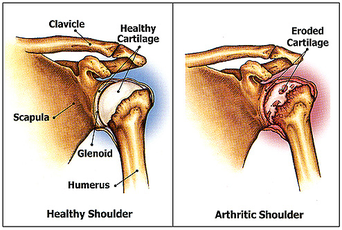Shoulder Arthritis
Arthritis is a degenerative condition affecting the cartilage and bone of the joint surfaces causing pain and stiffness. It most commonly affects older adults, however younger patients may also be affected if there has been a history of previous shoulder injury.

What are the causes of shoulder arthritis?
The bones in the shoulder joint are covered with cartilage which minimises friction and lubricates the joint. Over time, the cartilage gradually thins. The shoulder may then become painful and stiff. In later stages there may also be a clicking sound, particularly when you raise your shoulder above your head.
The most common form of arthritis to affect the shoulder is osteoarthritis which is the result of wear and tear and commonly affects middle-aged and older patients. Other forms of arthritis that might affect the shoulder include rheumatoid arthritis that is a swelling of the synovium lining, causing pain and stiffness.
The bones in the shoulder joint are covered with cartilage which minimises friction and lubricates the joint. Over time, the cartilage gradually thins. The shoulder may then become painful and stiff. In later stages there may also be a clicking sound, particularly when you raise your shoulder above your head.
The most common form of arthritis to affect the shoulder is osteoarthritis which is the result of wear and tear and commonly affects middle-aged and older patients. Other forms of arthritis that might affect the shoulder include rheumatoid arthritis that is a swelling of the synovium lining, causing pain and stiffness.
How will your arthritis be diagnosed?
During your consultation at Advance Physiotherapy, your therapist will identify the particular joint that is affected and assess the amount of discomfort and lack of mobility you are experiencing. They will usually arrange investigative tests such as X-rays to confirm the diagnosis.
Treatment of osteoarthritis depends on a number of factors. This typically focuses on your age, lifestyle and the degree of activity that you are hoping to return to. Non-surgical treatment options include anti-inflammatory medications and steroid injections. Surgical procedures may be an option. If required, your physiotherapist can refer you to an orthopaedic surgeon for a consultation.
During your consultation at Advance Physiotherapy, your therapist will identify the particular joint that is affected and assess the amount of discomfort and lack of mobility you are experiencing. They will usually arrange investigative tests such as X-rays to confirm the diagnosis.
Treatment of osteoarthritis depends on a number of factors. This typically focuses on your age, lifestyle and the degree of activity that you are hoping to return to. Non-surgical treatment options include anti-inflammatory medications and steroid injections. Surgical procedures may be an option. If required, your physiotherapist can refer you to an orthopaedic surgeon for a consultation.
For more information on the management and treatment of osteoarthritis of the shoulder, please get in touch with Advance Physiotherapy.